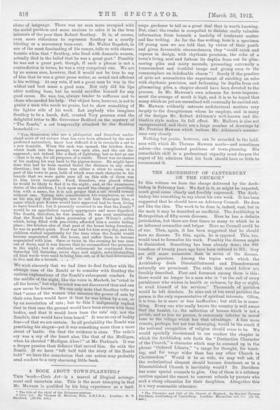THE ARCHBISHOP OF CANTERBURY ON THE CHURCH.* IN this volume
we have the charge delivered by the Arch- bishop in February last. We find in it, as might be expected, much good sense clearly and forcibly expressed. The Arch- bishop has something to say about his own work. It has been suggested that he should have an Advisory Council. He does not like the idea. The work to be done is, indeed, vast, but in the main it may be described as unofficial. The Archbishop is Metropolitan of fifty-seven dioceses. Here he has a- definite jurisdiction, but there are four times as many to which he is an informal counsellor and helper. Here no Council could be of use. Then, again, it has been suggested that he should have no diocese. To this, again, he is opposed. This, too, would tend to formalize his work. Possibly the diocese might be diminished. Something has been already done; the 408 benefices of twenty years ago have been reduced to 311; they are still more numerous than in seven of the diocese, of the province. Among the topics with which the Archbishop deals Disestablishment and Disendowment naturally are prominent. The evils that would follow are forcibly described. First and foremost among them is tbia there would no longer be a man who is "at the call of every parishioner who wishes in health or sickness, by day or night, to avail himself of his services." Thousands of parishes would be left desolate. In nine out of ten rural parishes the parson is the only representative of spiritual interests. Often, it is true, he is more or less ineffective ; but still he is some- thing. Every one who really knows the country is well aware that the hamlet, i.e., the collection of houses which is not a parish, and so haa no parson, is commonly inferior in moral tone to the village which has that advantage. A loss fliers remote, perhaps, but not less damaging, would be the result if the national recognition of religion should cease to be. We would specially recommend to our readers the chapter in which the Archbishop sets forth the "Distinctive Character of the Church," a character which may be summed up in the phrase "Ordered Liberty," "a range for thought, for teach- ing, and for usage wider than has any other Church in Christendom." Would it be so wide, we may well ask, if the ecclesiastical element should become dominant, as in a Disestablished Church it inevitably would P Dr. Davidson has some special counsels to give. One of them is a salutary caution against the resort to convent schools by parents who seek a cheap education for their daughters. Altogether this is a very seasonable utterance.
• The Character and Call of the Church of England. By Randall Thomas Davidson, Archbishop of Canterbury. London, Macmillan told Co. [2s. 51.
wt.]






































 Previous page
Previous page